During my years as a Peace Corps Volunteer, I often became hungry for home and American culture. On such occasions, I would gather with other villagers and watch American television shows on the village’s only TV where images of the United States appeared magically. Beamed via satellite through Paris after being translated into Quebecois French, the images unexpectedly found themselves on TV screens in remote West African villages. One night, Beverly Hills 90210 filled the screen with images of shiny cars, adobe-style mansions, and lush palm trees. At one point, Brenda took her dinner plate and fed her food to the family dog.
Everyone in the village turned to me and stared in disbelief: Could the United States possibly be so rich that we feed our food to dogs?
They didn’t know the half of it. Not only do the Brendas of Beverly Hills feed their dogs steaks; they also dress them up, carry them in purses, and create trendy storefronts entitled “Rescues Rule!”
Hollywood is surreal. Moments after arriving, I’m spellbound by buff beauty archetypes who bless the sidewalk with their footsteps. I almost scamper back to the realm of average mortals, but walk on because I’ve come to Los Angeles with another goal in mind: I’m in search of something real in the land of illusion.
I schlep across Los Angeles on a two-hour walk to the LA Ecovillage located squarely in the heart of the city. My rationale for the epic walk is to gain a greater sense of place, which I’m definitely getting-along with a sunburn, sweat-drenched clothes, and killer shin splints. Nowhere along the way do I find shade, a place to sit down, a public park. With a large pack on by back, I feel utterly self-conscious wandering down Melrose Avenue. Suspicious glances seem to whisper subtle accusations: What are you doing wandering around with no place to go? Shouldn’t you be buying something or driving somewhere?

The neighborhood changes from West Hollywood storefronts and movie studios to a predominantly Hispanic neighborhood and then a Korean neighborhood. The concrete reflects heat upwards and steel security fences continue their hostile surveillance until I turn the corner to the LA Ecovillage. Suddenly, lush vines, fruit trees, and shade lumber over the entry gate and onto the sidewalk. A hand-made sign asks motorists to “Please Slow Down.” I rest my pack on a large bench outside the gate and take a deep breath, already relaxing.
Inside, a bulletin board explains the Ecovillage Mission: “to exercise land stewardship as the basis for creating pedestrian-centered neighborhoods emphasizing affordable housing, work and recreational spaces that are economically and socially sustainable, and that integrate urban living with nature.”


The integration of urban living with nature is what impresses me most about the LA EcoVillage: the location couldn’t be more urban. The neighborhood mixes a multitude of cultures into a series of shops with Babylonic signs that line the car-jammed streets. During the Los Angeles Civil Uprisings of 1992, the Ecovillage found itself amidst social upheaval--two city blocks behind the Ecovillage were literally burnt to the ground.

After a delicious potluck dinner with community members, I chat with Lara who helps coordinate the Ecovillage’s multiple projects. She remembers the influence of the riots on the community’s vision: “It became about healing the social fabric, literally going out, meeting your neighbors, and telling other neighbors about those neighbors.”

Today, these 40 or so neighbors come together to live sustainably, creating a car-free (as nearly as possible) neighborhood, a food co-op, and numerous educational programs on their land.The people who live here and contribute to these programs bring a lot to the table (literally and metaphorically). Within an hour of arrival, I meet a woman who just graduated from medical school, a civil rights lawyer who works for an organization promoting public access to parks, and an educator who helps young people create short film documentaries about their lives. These are truly engaged and active community members that demonstrate what is possible when people work together.
It may not be the Los Angeles of pop-culture, but this corner of the city is reclaiming nature, exchanging car exhaust for fresh air, and turning illusion into reality. It gave me a new way of seeing Los Angeles and a new way of envisioning living space and community in general.
Thanks LA Ecovillage!

No comments:
Post a Comment
Whenever people agree with me I always feel I must be wrong.
- Oscar Wilde